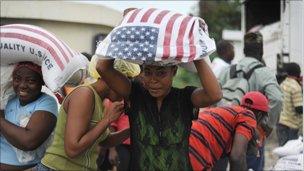US urged to stop Haiti rice subsidies
- Published

A leading aid agency has called on the United States to stop subsidising American rice exports to Haiti, the poorest country in the western hemisphere, because it says the policy undermines local production of food.
Former US President Bill Clinton, one of the architects of the subsidies to US farmers - and who is now, paradoxically, the co-chair of Haiti's earthquake recovery Commission - is quoted by Oxfam as saying that the policy was "a mistake".
"It may have been good for some of my farmers in Arkansas, but it has not worked," said Mr Clinton, a frequent visitor to Haiti.
"I have to live every day with the consequences of the lost capacity to produce a rice crop in Haiti to feed those people, because of what I did."
The aid agency says the $434m (£274m) paid annually in domestic US rice subsidies is more than the total US aid to Haiti of $353m.
The Oxfam report said subsidies paid to American farmers meant the rice they export to Haiti - known locally as Riz Miami or "Miami Rice" - is cheaper than locally produced rice.
The foreign rice that is "dumped" in Haiti therefore exacerbates the rural-urban drift that has seen the population of the capital Port-au-Prince balloon out of control as farmers who cannot feed themselves move to the city in search of employment.
The city was built in colonial times to house a few hundred thousand people.
But it now has a population of an estimated three million - most living in badly-constructed blocks which crumbled in January's devastating earthquake, making at least a million people homeless.
More than 230,000 people were killed in the 7.0 magnitude earthquake, which was centred near Port-au-Prince.
Rural impact
Haiti was encouraged by western countries to liberalise its economy in 1994. As it cut taxes on imports its own rice production plummeted.
In 1980, according to Oxfam, Haiti was virtually self sufficient in rice. But today it imports some 80% of its rice and 60% of its overall food supply.
"Trade liberalisation has exposed Haitian farmers to competition from subsidised US rice and made consumers vulnerable to volatile global food prices," said Oxfam.
The report says food aid can be another side to this problem.
In the month following the earthquake, for example, there was an international food aid "surge".
Although Oxfam says the aid was "unquestionably a necessity" because it reduced food prices and allowed people to eat, the price reductions also "negatively affected rural Haitians" who earn money from selling food to the cities and comprise the majority of the population.
The agency recommended that, wherever possible, food aid should be bought in local markets inside the country that is receiving the aid.
Oxfam also made numerous recommendations to the Haitian government aimed at reversing its historic bias favouring the elites in Port-au-Prince over the majority rural poor.
It said the government should:
- decentralise services away from the capital
- ensure that farmers have access to credit
- improve a land tenure system where most farmers have tiny parcels of land known as mouchwa - after the Creole word meaning "handkerchief-sized" - which they can be cheated out of by judges who award title to "whoever offers the biggest bribe"
The situation that Oxfam highlights is part of the bizarre relationship Haiti has with development aid donors and humanitarian workers.
Port-au-Prince is one of the aid capitals of the world.
By some estimates there are over 8,000 development charities working in the city - and almost every four-wheel drive vehicle you see on the streets there has the logo of an aid agency on its doors.
Yet the country remains mired in poverty. And many Haitians see the aid agencies primarily as sources of employment rather than as organisations that are making a difference in the long run.
- Published11 July 2010
- Published12 July 2010
- Published13 January 2010
- Published17 February 2010
- Published22 March 2010